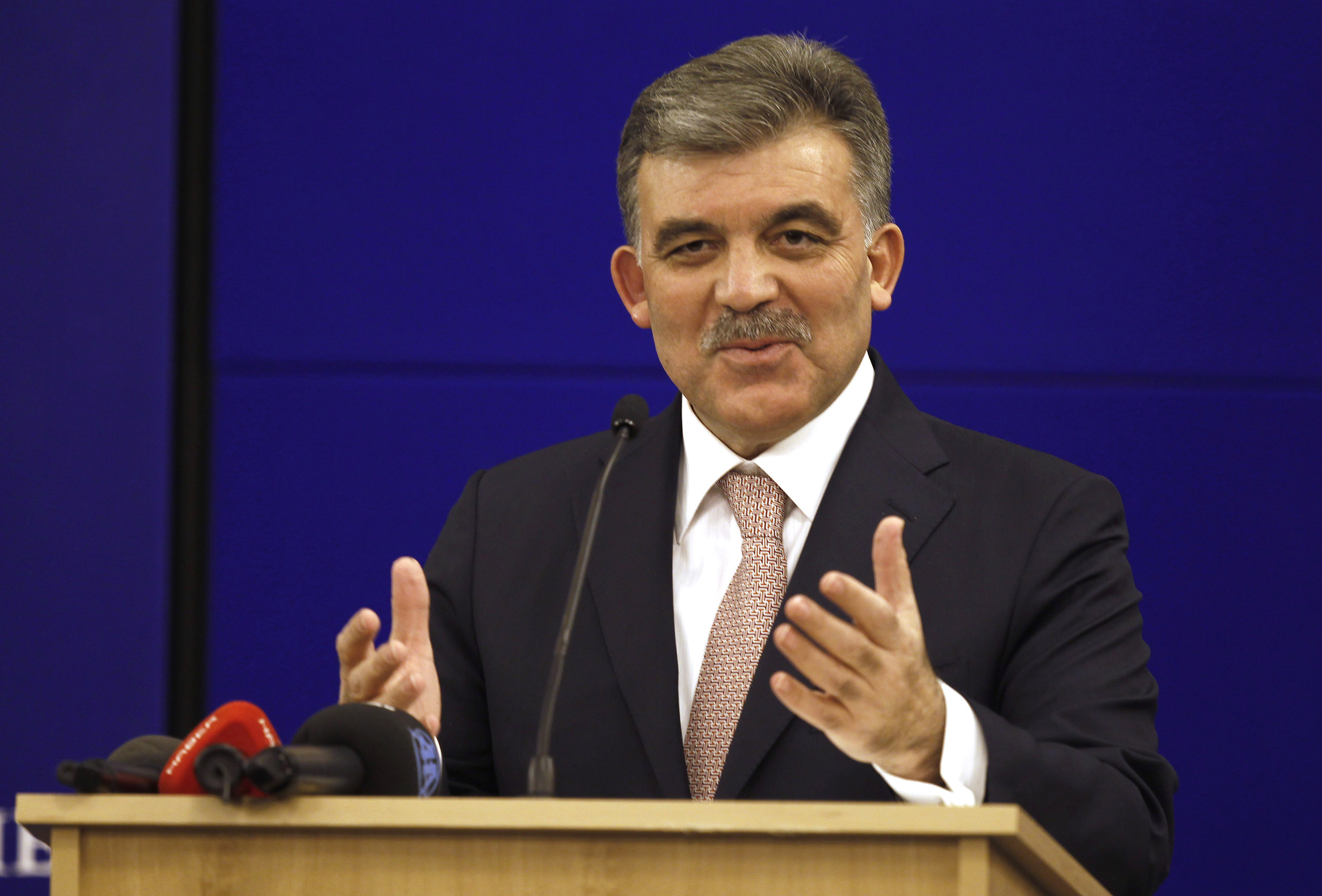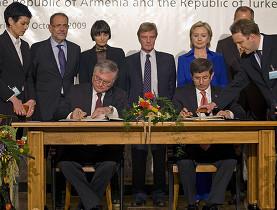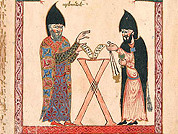Swiss and Turkish presidents seek solutions

Turkish President Abdullah Gül and Swiss counterpart Doris Leuthard will officially discuss “current issues” on his two-day state visit to Switzerland.
In practice, this means the conflict in Nagorno-Karabakh between Armenia and Azerbaijan which is holding up the ratification of a landmark deal signed by Turkey and rival Armenia in Zurich 13 months ago.
Gül – who is always seen smiling and likes to remind people that his name means “rose”, as in the flower, in Turkish – is generally considered more conciliatory than the forthright Turkish Prime Minister Recep Tayyip Erdogan.
But when it comes to the contentious issue of Turkey and Armenia, not much separates the two.
Swiss-Turkish relations became strained back in 2003, when the cantonal parliament of Vaud recognised as genocide the killing of more than 1.5 million Armenians in the Ottoman Empire at the beginning of the 20th century. Geneva and the House of Representatives followed suit.
In response, Ankara withdrew an invitation for Foreign Minister Micheline Calmy-Rey to visit the country. But relations have much improved since then.
Global player
Gül comes to Switzerland on Thursday with good cards: at home the Turkish government is enjoying economic and political success. The only snag is Ankara’s diplomatic U-turn on the treaty signed with Armenia in Zurich in October 2009.
What’s more, the ruling Justice and Development Party (AK Party) strengthened its diplomatic position on September 12 when voters approved 26 amendments to Turkey’s constitution, written in the aftermath of a 1982 military coup.
The Turkish economy has largely resisted the economic and financial crisis: growth rose to 5.6 per cent in 2009 and Turkey has become an essential part of the regional and global energy policy. At the end of last year Switzerland signed a deal in Istanbul for the delivery of energy resources from the Caspian Sea and Iran via Turkey.
Welcomed at the heart of the G20 – unlike Switzerland – Turkey is asserting itself among the emerging powers.
Turkey doesn’t have any simmering anger with Switzerland, but there is a running battle going on with France and Germany, both of whom vociferously oppose Turkish integration in the European Union.
Foreign strategy
Not to mention dynamic Foreign Minister Ahmet Davutoglu, whose doctrine of “problem-free strategic depth” with his neighbours has resulted in mixed success (good marks with Russia, Iraq, Syria, Serbia and Russia; not so good with Israel and Cyprus). But the intention – albeit occasionally a little naive – is good.
It was in this spirit – following years of negotiations and clandestine meetings – that the Turkish government signed the so-called Zurich Protocols in October 2009.
These aimed to re-establish diplomatic relations between Turkey and Armenia and re-open the border, closed by Turkey in 1993 following the Armenian occupation of the Nagorno-Karabakh enclave in Azerbaijan.
Problem solving
If Davutoglu was hoping for a “problem-free” relationship with his Armenian neighbours, he had forgotten the latter’s “problem-full” relationship with Azerbaijan.
The Azerbaijan government came out against the Zurich deal and any normalisation between Turkey and Armenia which would deprive them of a means of pressurising Armenia and would confirm the occupation of Nagorno-Karabakh.
Initially a close ally of Turkey, Azerbaijan threatened to turn off the gas taps. Faced with this pressure, Recep Tayyip Erdogan made a U-turn the day after signing the protocols and linked their ratification to the Nagorno-Karabakh problem.
Officially, Armenia froze the process, but Leuthard and Gül have recently let it be known that confidential talks would continue.
Some people with knowledge of the dossiers say it is not out of the question that the Turkish government could ratify the protocols after its probable victory in next year’s general election.
Gül could ask Switzerland – together with the United States, which is looking to limit Russian influence in the region – to help it find a solution that is acceptable to both Turkey and Azerbaijan, Switzerland’s other important energy partner.
However such a request is likely to be contested. Sarkis Shahinian, head of the Swiss-Armenian Association, has commented that “Switzerland shouldn’t fall into this trap”.
The Nagorno-Karabakh question should be kept separate to the 2009 accord, which “should not include preconditions”, he said.
Turkey has had close ties with Switzerland since the Turkish Republic was founded in 1923. The Lausanne Peace Treaty is regarded as the founding charter of the Republic of Turkey.
In 1925, Switzerland and Turkey concluded a Treaty of Friendship and in 1926, as part of the reform of civil and marriage law, Atatürk had the progressive Swiss Civil Code adopted almost verbatim in Turkish law. The 80th anniversary of this adoption was celebrated in 2006.
Switzerland supports the reform efforts with a view to Turkey joining the European Union. Turkey is able to play an important role as a bridge-builder between the Muslim world and the West.
Turkey is an important trade partner and a promising market for Switzerland. More than 450 Swiss firms operate there, providing around 14,000 jobs. Switzerland is the 12th biggest investor in Turkey.
With around 100,000 people (one fifth of whom have dual nationality), the Turkish community in Switzerland is one of the country’s biggest foreign communities.
In the 1990s, Switzerland committed SFr4 million to combating poverty in the eastern part of Turkey. Following the severe earthquake in 1999, it provided emergency aid and funds of SFr20 million to support prevention and contingency programmes on earthquake safety.
(Source: Swiss foreign ministry)
Head of state: Abdullah Gül
Head of government: Recep Tayyip Erdogan
Population: 70.5m
Swiss colony: 2,453 people
Swiss exports: SFr1.8 billion (3.8% of Turkey’s foreign trade)
Swiss imports: SFr695 million (1.4% of foreign trade)
Swiss tourists to Turkey in 2009: 283,000 (+12%)
(Source: Swiss foreign ministry)
(Adapted from French by Thomas Stephens)

In compliance with the JTI standards
More: SWI swissinfo.ch certified by the Journalism Trust Initiative




You can find an overview of ongoing debates with our journalists here . Please join us!
If you want to start a conversation about a topic raised in this article or want to report factual errors, email us at english@swissinfo.ch.